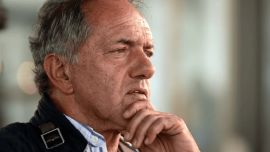Today is a very special anniversary (and will be even more special next year when, barring any extreme misfortunes, it will mark four decades of uninterrupted democracy, almost certainly accompanied by the inauguration of a new president), so that will be today’s topic for a column dedicated to linking past and present rather than this week’s burning news such as the verdict in the vice-presidential trial or a World Cup heading into its decisive stages – plenty on both elsewhere in this newspaper.
“Bliss was it in that dawn to be alive .. But to be young was very Heaven!” was the immediate reaction to the French Revolution of the poet William Wordsworth then travelling in France as a recent Cambridge graduate – there was a similar and very palpable mood of euphoria surrounding this day here 39 years ago, deliberately chosen by Radical election winner Raúl Alfonsín for his presidential inauguration as Human Rights Day worldwide (since 1948). One very raw measure of that euphoria was the fact that the birth rate in the Orwellian year of 1984 was almost 20 percent higher than in the last year of dictatorship.
In hindsight this euphoria might be hard to understand, given that 1983 annual inflation was measured at 343 percent (as against a world average of under nine percent) – more than treble the inflation now driving just about everybody into the depths of despondency and resignation in total contrast to the exhilarated optimism and hopes for the future back then. Debt overhang was also a formidable problem jeopardising economic stability – the foreign debt, which the military dictatorship had increased sevenfold, stood at US$43.67 billion when Alfonsín took office, around as much as now owed to the International Monetary Fund (IMF) in times when the greenback had treble its purchasing-power today. Nevertheless, this debt was far from record levels at “only” around 40 percent of gross domestic product and nor did Argentina’s record here stick out in the world as much as in the inflation rankings – the epicentre of a 1982-1983 debt crisis hitting numerous countries was not Argentina but Mexico, which directly stopped servicing its foreign debt. Hard as it might be to imagine now, South Korea had very comparable debt problems to Argentina back then (to be repeated in more extreme form in 1997-1998 when Time magazine speculated that the country might fall off the map). Misery loves company.
So with every reason to see the 1989 hyperinflation as an accident waiting to happen, why the great expectations 39 years ago today? From a political standpoint at least not so very difficult to understand. Not only should the enormous relief upon emerging from a dictatorship be largely self-explanatory by itself – it was boosted by simultaneous liberation from the pre-military government creating the vacuum making the 1976 coup almost inevitable in the form of the defeat of Peronism. Thus Alfonsín’s election victory and inauguration gave most people every impression of a fresh start even if a Radical party then nearing its centenary (it was founded in 1891) could hardly be described as a new force.
Strange as it might sound after an election in which Alfonsín and his Peronist rival Italo Argentino Luder pooled 92 percent of the vote between them, the political climate was less poisonously polarised back then than now. The Peronists were too stunned to react immediately and when they did, it was to question their own kind (much as the country turned against the military “marshals of defeat” following the disastrous South Atlantic war of 1982), even if their Renewal Front only crystallised shortly before the 1985 midterms.
Furthermore, the defeat was relative for the Peronists because at provincial level they won in 13 of the 23 districts (Tierra del Fuego did not become a province until 1991), thus automatically giving them a Senate majority with 26 of the 46 seats since senators were direct provincial government nominees before the 1994 constitutional reform. Just as knowledge that he has a stranglehold on Congress seems to have made it easier for the impossibly arrogant Jair Bolsonaro to accept presidential defeat in Brazil last October, so Senate supremacy was a consolation prize reconciling Peronism to the new democratic order.
This institutional foot in the door also made for a more genuine separation of powers with a much stronger degree of institutional health – that abstract, almost invisible but vital ingredient – then than now. A president elected by an absolute majority and an equally democratic and pluralistic Congress were complemented by one of the most balanced Supreme Courts ever. This was in part the result of the government’s minority status in the Senate, making Congress consensus unavoidable. At least two of the quintet (Carlos Fayt and Enrique Petracchi) persisted for over three decades as justices through various different governments without losing the respect of their judicial colleagues – another (José Severo Caballero) even had the right name because is not “a severe gentleman” as good a description of the ideal judge as any?
With the military lying low until the Easter rising of 1987, perhaps the main fly in the ointment was the series of 13 CGT general strikes already beginning in mid-1984. These are usually given a bad press for destabilising an infant democracy, and quite justly, but at the same time a wage-price race should not be too difficult to understand with the aforementioned annual inflation of 343 percent. Furthermore, the CGT had grounds for taking umbrage at Alfonsín’s slur of a “military-union pact,” which might have some historical validity (for the 1966 far more than the 1976 coup) but could never cover the entire labour movement by any stretch of the imagination.
Almost 1,000 words now written on the 1983 return to democracy and this column does not even begin to convey the unique atmosphere of that magic moment in Argentina’s turbulent history.



















Comments